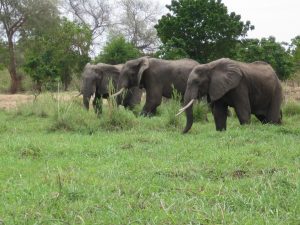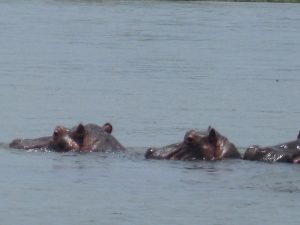 I wish I could tell you that I jumped right into the local cuisine of Zambia, including the nshima that I had had in Malawi a couple of years ago and the caterpillars sold along the roadside. Unfortunately, I had neither.
I wish I could tell you that I jumped right into the local cuisine of Zambia, including the nshima that I had had in Malawi a couple of years ago and the caterpillars sold along the roadside. Unfortunately, I had neither.
On Sunday after church we drove for most of the day from Gulu to Kampala, getting in at 9:30 PM before arising at 1 AM to catch the plane for Lusaka, Zambia. When we arrived in Lusaka at around 11 AM, our guide took us to Shop Rite to load up on snacks for yet another long drive to the Copper Belt.
You’d think we’d died and gone to heaven. After a week of eating pretty much only local Ugandan food, we found ourselves in a store filled with any type of American or other food you could possibly want. We bought some Pringles and Snickers and Coke and lots of bottled water for the journey. Then we went to a takeout pizza place since we were already behind schedule. Iona (the other person from CRWRC) and I looked at each other and sighed as we tasted the familiar ham and pineapple and cheese and crust. Forgive me, locavores, but we were at the 7-10 day point in our journey, when tempers start to flare, the novelty of being in a different culture wears off, and home seems very far away. This taste of home (albeit not as processed and not quite exactly like the pizza in the States) was a much needed respite.
 We arrived in the Copper Belt very late, and were too full from the snacks to take part in the traditional Zambian food buffet at the lodge where we were staying. While caterpillars were on the menu, our guide Alfonsias said that his tribe does not eat such things. Furthermore, he was shocked to learn that we had eaten goat while in Uganda. We learned that Zambia is a very peaceful country, made up of several ethnic groups each with their own unique cuisines and traditions. Therefore it felt a little more socially forgiving than our time in Zambia where no women wore trousers and greetings and social interactions were very formal. We could wear pretty much what we wanted as long as we donned a chitenje (wrap skirt designed for modesty and to keep one’s dress clean).
We arrived in the Copper Belt very late, and were too full from the snacks to take part in the traditional Zambian food buffet at the lodge where we were staying. While caterpillars were on the menu, our guide Alfonsias said that his tribe does not eat such things. Furthermore, he was shocked to learn that we had eaten goat while in Uganda. We learned that Zambia is a very peaceful country, made up of several ethnic groups each with their own unique cuisines and traditions. Therefore it felt a little more socially forgiving than our time in Zambia where no women wore trousers and greetings and social interactions were very formal. We could wear pretty much what we wanted as long as we donned a chitenje (wrap skirt designed for modesty and to keep one’s dress clean).
We had two long days of meetings with churches, where we learned about their volunteer HIV and AIDS programs and care for widows and orphans. It was very encouraging, and the urban setting was more familiar and relaxed. On Wednesday we drove back and had dinner very late (are you noticing a pattern here?) at Eli (our Zambia country consultant) and Evelyn’s home. They are from the Philippines and made us a traditional meal of rice, cabbage, chicken, and vegetables that were very flavorful. They have lived in Zambia for nearly three years now, and were just starting to feel at home. Their Filipino food helped them remember their roots, and it was then that I realized how important food is in grounding one’s culture.
 The following day we had our first non-work day of the trip, and we went on a river safari where we saw elephants, hippos, a crocodile, beautiful birds, and baboons all in their natural habitat. It was a glorious break from interviews, note taking, and relationship building. That evening we had dinner at Zakka (our Southern Africa team leader) and Habiba’s home. They are originally from Nigeria and have only been in Zambia for just over a year. They made us a traditional Nigerian meal of pounded yam, chicken, joloff rice, and egusi soup. Habiba gleefully explained how they smuggle the pounded yam powder and seasonings for the egusi soup into Zambia. We appreciated the efforts, as the dinner was very tasty.
The following day we had our first non-work day of the trip, and we went on a river safari where we saw elephants, hippos, a crocodile, beautiful birds, and baboons all in their natural habitat. It was a glorious break from interviews, note taking, and relationship building. That evening we had dinner at Zakka (our Southern Africa team leader) and Habiba’s home. They are originally from Nigeria and have only been in Zambia for just over a year. They made us a traditional Nigerian meal of pounded yam, chicken, joloff rice, and egusi soup. Habiba gleefully explained how they smuggle the pounded yam powder and seasonings for the egusi soup into Zambia. We appreciated the efforts, as the dinner was very tasty.
The next morning we left for the airport, and began our 32 hour journey home. I couldn’t wait for a warm shower, to sleep in my own bed, to see my husband, to brush my teeth with tap water, and cook familiar food in my own kitchen. For while it is fun to explore other cultures and food, there’s no place like home.

